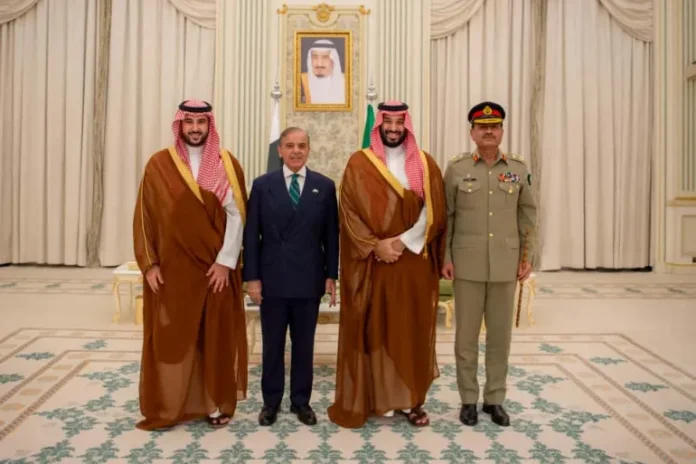Washington Reframes Its Presence
The United States no longer seeks to dominate the Middle East with permanent deployments and massive financial commitments. Instead, Washington encourages partners to assume regional responsibilities under American direction. Saudi Arabia and Pakistan have emerged as key pillars of this restructured framework, combining resources and military capabilities to address threats. American officials prefer this model because it lowers costs while maintaining strategic leverage. The recent Saudi-Pakistani defense pact reveals how Washington advances influence by outsourcing security to regional actors.
A Partnership Forged in Shared Needs
The relationship between Saudi Arabia and Pakistan dates back to Pakistan’s independence in 1947, when Riyadh became one of its earliest supporters. Saudi Arabia provided loans and oil during Pakistan’s economic crises and stood by Islamabad after wars with India. Pakistani forces, in turn, trained Saudi troops and defended the kingdom during conflicts. Their cooperation intensified during the Cold War, as both confronted challenges from Iran and the Soviet Union. Muhammad bin Salman later expressed the depth of this bond, declaring, “If Iran secured a nuclear weapon, Saudi would seek one, too.”
Troops in Mecca and Oil in Hardship
A defining moment came in 1979, when Islamist militants seized the Grand Mosque in Mecca, shaking the Saudi monarchy. Pakistani advisers assisted Saudi forces in retaking the holy site, cementing Islamabad’s reputation as a reliable defender of the kingdom. Throughout the 1980s, tens of thousands of Pakistani troops remained deployed in Saudi Arabia to secure its borders and facilities. Saudi Arabia rewarded this loyalty with economic support during Pakistan’s many financial downturns. When Pakistan conducted nuclear tests in 1998, Riyadh was one of the only governments to provide oil and funding openly.
A Trigger From Israel’s Expanding Strikes
Recent Israeli strikes across the region pushed Saudi Arabia and Pakistan closer together again. Jeffrey Sachs observed, “This is a very serious matter because Israel attacked a country that was not involved in this conflict other than facilitating mediation, mediation that the United States ostensibly was supporting.” His remarks referred to Qatar, a U.S. ally hosting a major American base, yet Washington did not act. A senior American official admitted the limits of American resolve, saying, “Well, I’m not thrilled. I’m not thrilled about it. We are not thrilled about the way that went down today. What’s happened has happened. Obviously, we were not happy about it. The president was not happy about it. Now, we need to move forward and figure out what comes next.” These exchanges convinced regional leaders that America’s guarantees were no longer sufficient.
Pakistan’s Renewed Role as Military Provider
Saudi Arabia turned to Pakistan for manpower and nuclear deterrence, codifying this relationship through the recent pact. Pakistan’s defense minister declared, “The pact and the Pakistani nuclear umbrella could be expanded and even apparently floated the idea of a quote Arab Islamic NATO.” His statement indicated ambitions that go beyond defending Saudi territory. Riyadh finances operations, while Islamabad supplies trained troops accustomed to regional conflicts. Together they create a credible structure that aligns with Washington’s vision of burden sharing.
Washington’s Delegated Blueprint
American officials view these arrangements as part of a global strategy to reduce dependence on U.S. troops. In Europe, NATO already offers a shared framework where American command provides structure, but the Middle East lacks such cohesion. Washington therefore encourages bilateral agreements like the Saudi-Pakistani pact, which combine financial and military resources under loose American oversight. This approach lets Washington focus on broader global competition while maintaining sway in the Middle East. The outsourcing model reveals how America reduces exposure without losing control.
Distrust of Washington’s Direction
Regional skepticism has deepened as American policy appears inseparable from Israeli priorities. Jeffrey Sachs explained, “There is no American foreign policy. People should understand there is only Israeli foreign policy implemented by a kind of puppet regime in the United States.” His words reflected widespread frustration with Washington’s unwillingness to restrain Israel. This perception motivates Arab states to construct their own guarantees of survival. That pursuit is now reshaping regional alignments.
Ambitions for an Expanding Coalition
The Saudi-Pakistani pact may serve as the foundation for a broader Islamic defense coalition. Iranian President Masoud Pezeshkian called for an “Islamic alliance to deter Israel,” while Pakistani Defense Minister Khawaja Asif spoke of an “Arab Islamic NATO.” These visions suggest an emerging framework that includes financial power, troop strength, and nuclear protection. Washington would still maintain influence by shaping the parameters in which such a coalition develops. This expansion demonstrates how local initiatives remain tied to American expectations.
Israel’s Role in Blocking Peace Efforts
Israeli behavior also fuels the urgency of these new arrangements. Jeffrey Sachs described it bluntly: “Israel does not want any diplomacy. Israel wants complete domination and complete submission of the rest. Negotiators get in the way. They might reach an agreement. That’s when they become real targets for Israeli assassination.” His words show how negotiators face danger when they threaten entrenched positions. This perception encourages Arab governments to focus on deterrence rather than negotiations.
Outsourcing as Long-Term American Strategy
Washington’s reliance on partners does not signal withdrawal, but reallocation of responsibilities. Saudi Arabia supplies financial backing, Pakistan supplies soldiers, and Washington shapes strategy from a distance. This model reduces American costs while preserving decisive influence. For Saudi Arabia and Pakistan, it offers prestige and protection while keeping them inside Washington’s orbit. For the region, it raises questions about whether shared burden will bring stability or fuel new rivalries.
Future of Regional Security Architecture
Saudi Arabia and Pakistan embody the new vision of Middle Eastern security architecture encouraged by Washington. Their cooperation demonstrates how local powers manage threats under American guidance, creating an outsourced model of influence. The history of their partnership reveals continuity, not rupture, in aligning with U.S. goals. Washington may reduce its physical footprint, but its strategic hand remains visible. The question is whether these alliances will deliver security or institutionalize dependence under American direction.

